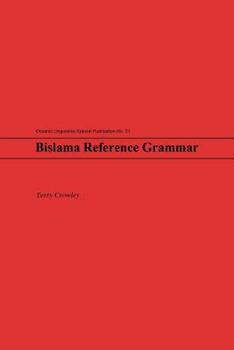Bislama Reference Grammar
(Part of the Oceanic Linguistics Special Publications Series)
Bislama is the national language of Vanuatu, the world's most linguistically diverse nation with at least 80 actively spoken Oceanic languages used by about 200,000 people. Bislama began as a plantation pidgin based on English in the nineteenth century, but it has since developed into a unique language with a grammar and vocabulary very different from English.
It is one of very few national languages for which there is no readily available reference grammar. This book aims to fill this gap by providing an extensive account of the grammar of Bislama as it is used by ordinary Ni-Vanuatu. It does not, therefore, aim to describe any kind of artificial written norm but sets out to capture a range of different kinds of ways that Ni-Vanuatu will say things in various contexts, both written and spoken, formal and informal. The thrust of this volume is to show that Bislama has a grammar--an unfamiliar concept for those educated in Vanuatu. It also shows that Bislama is a language of considerable complexity, which will come as a surprise to many of its users, who have been taught to view their language as somehow "simple" and even "deficient."Format:Paperback
Language:English
ISBN:0824828801
ISBN13:9780824828806
Release Date:May 2004
Publisher:University of Hawaii Press
Length:224 Pages
Weight:0.85 lbs.
Dimensions:0.5" x 6.4" x 9.0"
Related Subjects
Language ArtsCustomer Reviews
0 rating





